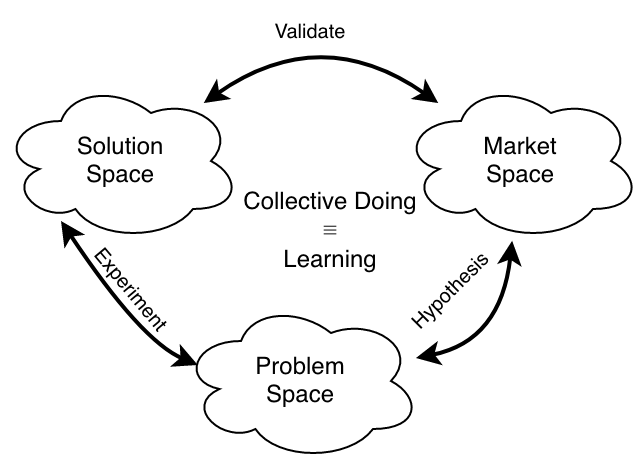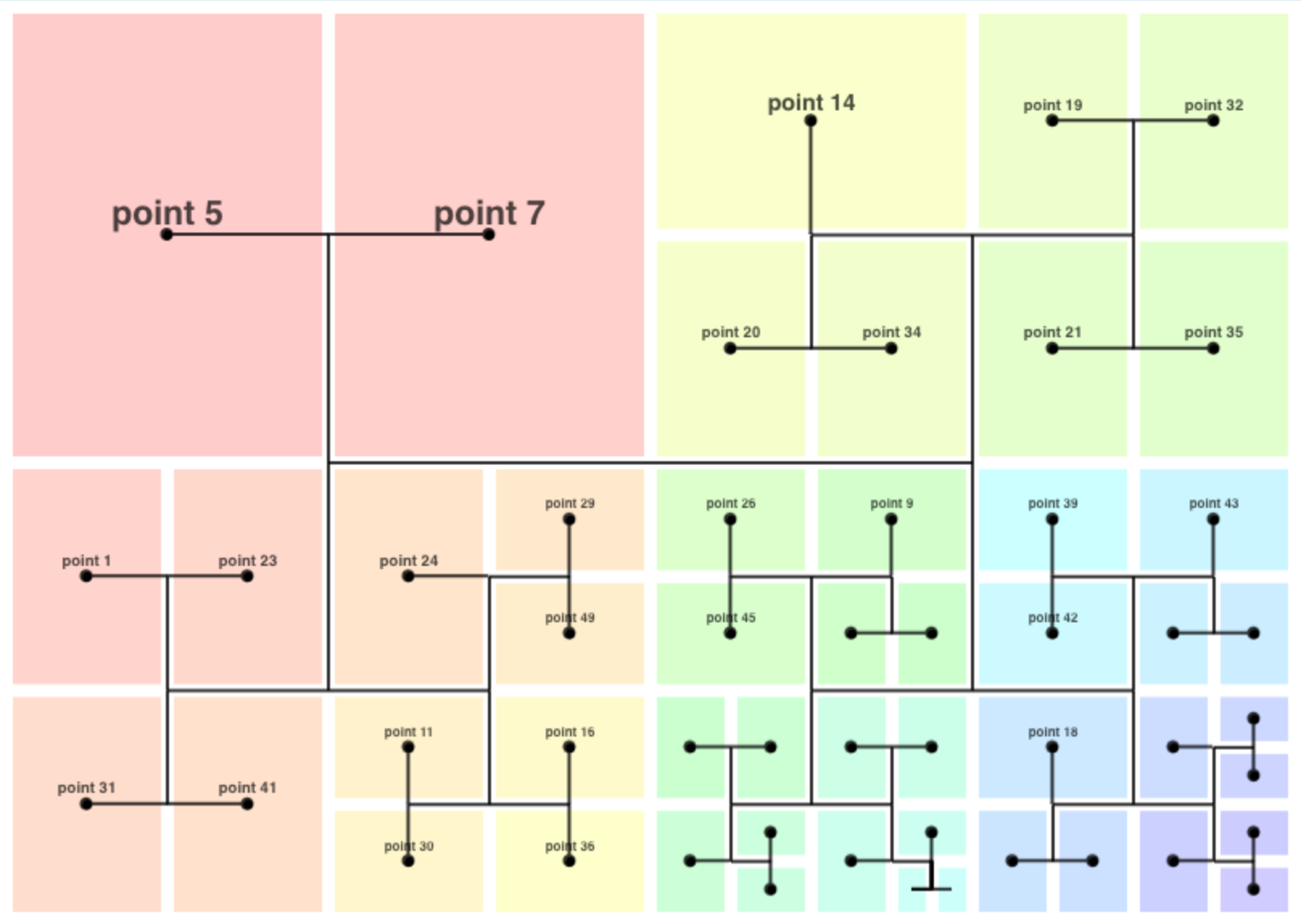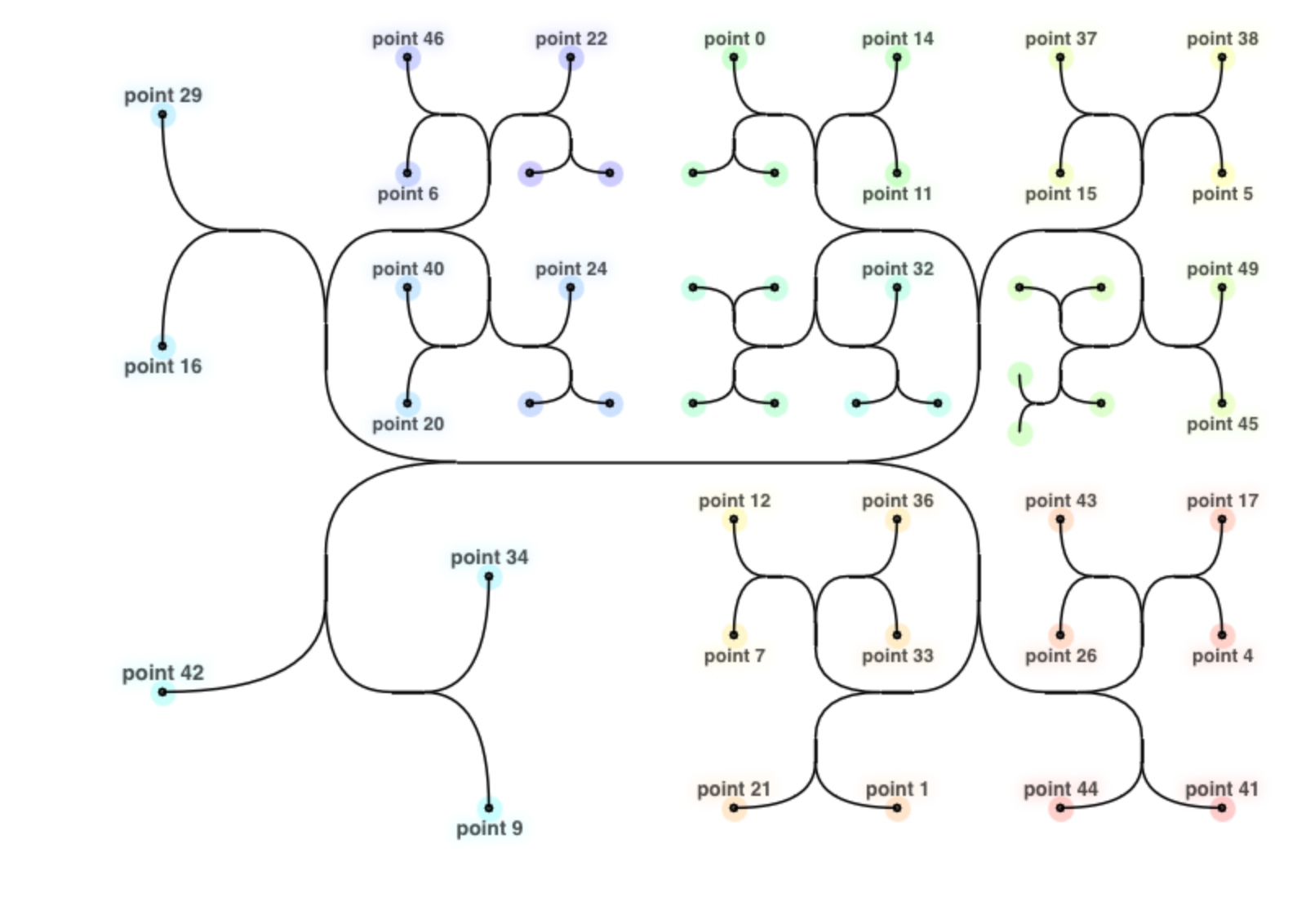How Do We Do?
One of the main hurdles when building a company is figuring out how to scale decision making

| IC | Manager | Exec |
|---|---|---|
| Thriving | Outcomes | Alignment |
| 1 | 3-5 | 15 | 50 | 150 | ... |
|---|---|---|---|---|---|
| self | group | 3 groups | ... |
Every combination is a different relationship and collaborates differently.
- The effectiveness of a collaboration model is influenced by the scope, the context, and the motivation under which it's utilized.
- Ideal collaboration happens when the ownership of the work, the motivation to do it, and the authority to complete it are all mutually aligned.
- There's another set of factors here: Time, and Stability.
(They're less relevant than you'd think) - We think of Time as teams having a life-cycle, but that's not really true in the traditional "Forming, Norming, Storming, Dying" sense.
- We like stability because it's an effective compensation mechanism for working around bad management, poor alignment, lack of agency, overload, and context switching.

-
Vertical
- Specialized Knowledge
- Effective action in the organization
- Cognitive overhead required for doing
- Utilizes consensus
Horizontal
- Collective Knowledge
- Effective learning in the organization
- Cognitive overhead required for collaboration
- Utilizes alignment
Scaling Decision Making
- Shape motivation
- Understand relationships
- Scope context
- Building a stable base of knowledge is how you scale collective learning as a society
IgnoranceLimited Context is a feature, not a bug
- IC
- Systems engineering through technical work
- Manager
- Systems engineering through people work
- Exec
- Systems engineering through systems work
What is a Platform?
Platforms Are a Way to Scale Doing
What is a Platform?
- IC
- Platforms are the Dual of Libraries
- Manager
- Platforms turn Service Teams into Product Teams
- Exec
- Platforms derisk diversification by exploiting the economics of agglomeration
Totes Platforms™
- Kubernetes
- Design Systems
- Programs
- Education Curriculum
- Corn
- Sales Funnel
- Jazz Standards
- Mission, Strategy, Vision, Objectives
- Executive Alignment
- Policy
- Language
- APIs
- ISO Standards
- Algebraic Structures Equivalent to Computational Models
regex is a platform. die mad about it.
Platforms Are Not
These are tools and a means to an end
- Platforms
- DevOps
- Kubernetes
- Libraries
- Process
- Culture
- Infrastructure
- Golden Paths
- SDKs
- Self-Service Platforms
- Cookbooks
- Enabling / Platform Teams
Platforms ≠ Platform Engineering
Libraries vs Platforms
Libraries
- Representation of domain knowledge
- Abstracts over implementation
- Interfaced with via process
- Codifies semantics
- Multiplier for platforms
Platforms
- Representation of knowledge application
- Abstracts over integration
- Interfaced with via policy
- Codifies workflow
- Enables library creation
Platforms Turn Services into Products
This isn't always good.
It's not always what you want.
You will always need both services and products.
Platform Synergy
- IC
- Libraries are the building blocks of Platforms
- Manager
- Platforms synergize with executive alignment and team dynamics
- Exec
- Platforms operationalize Libraries the way Programs operationalize Policy
DevOps vs
SRE vs
Platform Engineering
- DevOps
- A culture of whole-system ownership motivated by broadening horizontal context
- SRE
- A specialist role in resilience engineering that naturally arises when horizontal context becomes too large for any one team
- Platform Engineering
- An empathy-driven approach towards sociotechnical organizational design
What is a Platform?
- IC
- Platforms are the Dual of Libraries
- Manager
- Platforms turn Service Teams into Product Teams
- Exec
- Platforms derisk diversification by exploiting the economics of agglomeration
What Makes Platforms Work?
What Makes Platforms Work?
- IC
- Abstractions that are force multipliers
- Manager
- Interfaces between teams that reduce cognitive overhead
- Exec
- Consistent language and mental models that enable aligned innovation
Mapping Organizational Structures to Doing
Slicing Context - Functional

Slicing Context - Product

Slicing Context - Matrix

Directional Context
Vertical
- Specialized Knowledge
- Effective action in the organization
- Cognitive overhead required for doing
- Utilizes consensus
Horizontal
- Collective Knowledge
- Effective learning in the organization
- Cognitive overhead required for collaboration
- Utilizes alignment
Context + Collaboration
| Vertical ctx size | Horizontal ctx size | Collaboration Complexity | Market Agility | |
|---|---|---|---|---|
| Functional | high | low | low | low |
| Product | moderate | moderate | moderate | moderate |
| Matrix | high | high | high | high |
Cheating the Matrix
If you "aren't" a matrix organization, but...
- You have teams that rotate projects
- "Dynamic" or "rotating" teams are a thing
- You keep "shifting left" everything
- You compulsively CC 5+ people on every email
You may be entitled to financial compensation
Call H. E. Weakly (877 RE-ORG)
-
Building a stable base of knowledge is how you scale collective learning as a society
But, how do you build a base of knowledge if scaling requires managing context?
-

Shrinking Context
- IC
- Well designed abstractions
- Manager
- Thoughtful interfaces between teams
- Exec
- Consistent language and mental models
-
Well designed abstractions are both transparent and opaque
-
Thoughtful interfaces between teams result in effective collaboration models
-
Humans chunk concepts together to build on top of them
Providing consistent language and mental models allows people to build their own chunks in a way that results in aligned growth of understanding
Properties of Good Platforms
- Reduce horizontal context
- Enable emergent innovation
- Enable experimentation
- Minimize migration cost
- Minimize collaboration model overhead
- Improve feedback loops
- Minimize context switching
- Reduce IC context overhead
What Makes Platforms Work
- IC
- Abstractions that are force multipliers
- Manager
- Interfaces between teams that reduce cognitive overhead
- Exec
- Consistent language and mental models that enable aligned innovation
When to Platform
My Sincere Apologies to Finance Teams and MBAs
Economics ⇔ Technology
| Economics | Technology |
|---|---|
| Scarcity Economy | Post-Scarcity Economy |
| Fiat currency | Social currency |
| Market pressure | Consensus |
| Markets | Tech Stacks, Codebases |
| Fiscal Debt, Inflation | Tech Debt |
| Economies | SDLC, DevEx |
| Context | Cognitive Overhead |
Economic Model - Functional
- Economics of scale
- Tech Vertical - often viewed as a cost center
- Value generation comes from removing waste from feedback loop
Economic Model - Product
- Economics of scope
- Tech Vertical - often viewed as a profit center
- Value generation comes from reuse of overhead when diversifying
Economic Model - Matrix
- Economics of density
- Often viewed as
too much paperworkmultiple centers - Value generation comes from efficiencies generated by peer proximity
Continuity, Economics
| Economy | Growth Strategy | Continuity | Risk | Market Agility | |
|---|---|---|---|---|---|
| Functional | Scale | Market Development | low | low | low |
| Product | Scope | Product Development | high | moderate | moderate |
| Matrix | Density | Diversification | moderate | high | high |
Platform Economics

- Libraries mature market development
- Platforms mature product development
-

Platform Engineering derisks effective diversification
-

- Blocks can be seen as services
- Groups of blocks can be seen as product offerings
- Clusters are economic optimization opportunities
- Nodes are teams
-

- Branches can be seen as codebases
- Branch clusters can be seen as problem domain understanding
- Clusters are economic optimization opportunities
- Nodes are teams
When to Platform?
Platforms make sense when the benefits of reducing horizontal context more than offset the overhead of adding a vertical to the organization.
Platforms must be more than the sum of their parts
How to Build High-Impact Platforms
The Blueprint: LOVE
- Listen
- Observe
- Validate
- Empathize
Not the Blueprint: EVIL
- Examine
- Vindicate
- Implement
- Launch
Love vs Evil
They're surprisingly similar, really
Love
- Listen
- Observe
- Validate
- Empathize
Evil
- Examine
- Vindicate
- Implement
- Launch
Empathy
- Perspective taking
- Recognize other people's perspectives as their truth
- Staying out of judgement
- Suspend judgement and be curious
- Recognizing emotion in other people
- Recognize and acknowledge other people's emotions
- Communicating emotion
- Communicate your understanding of other people's emotions
Step-By-Step Recipe
Agglomeration-based development
- Ask people where the pain clusters are
- Find the pain clusters
- Compare results
- Solve the most painful cluster
-
IC
- Ask individuals on your team what their pain points are
- Look for duplication of effort, code, process, communication
- Compare results
-
EM
- Ask teams you interface with what their pain points are
- Look for duplication of workflows, interfaces, process, planning
- Compare results
-
Exec
- Ask organizational leaders what their pain points are
- Look for duplications of language, vision, alignment efforts, programs
- Compare results
Understanding Each Other
Motivation
- IC
- Thriving
- Manager
- Outcomes
- Exec
- Alignment
-
Priorities
- IC
- Reduction of toil
- Manager
- Optimization of team interactions
- Exec
- Long term alignment of innovation
Takeaways
A Platform Is An Abstraction That Platforms Like A Platform
Platform teams are organizationally empowered to address cross-cutting changes
With a combination of technical, procedural, and cultural improvements
Platform Engineering can turn culture into an intuition around how to use a platform
Make Change Easy to Handle, Not Easy To Do
Failure Modes
- DevOps tends to fail because the sharp and blunt ends of a system are rarely aligned and addressing that requires a cultural shift
- SRE tends to fail when implemented prematurely; it only makes sense when the horizontal context is too large for any one team
- Platform Engineering tends to fail when implemented without empathy and diversity
- Platform Engineering tends to fail when an agglomeration based approach isn't used to address optimizations
Platforms are a way to scale doing
What is Platform Engineering
- IC
- Empathy Driven Development
- Manager
- Empathy Driven Collaboration
- Exec
- Empathy Driven Organizational Design